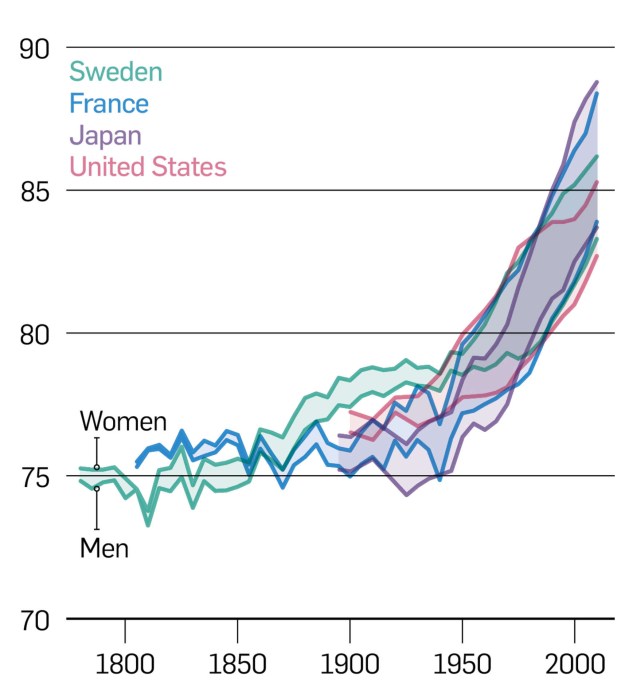Is Age Just A Number? How Perceptions Of Age Impact Our Lives

Table of Contents
Societal Perceptions of Age and Their Consequences
Societal stereotypes about different age groups profoundly shape expectations and opportunities. These ageist attitudes manifest in various ways, creating systemic disadvantages for individuals at different life stages. Negative stereotypes often portray young people as irresponsible or lacking experience, middle-aged individuals as facing a mid-life crisis or being past their prime, and older adults as frail, dependent, and senile. These harmful stereotypes limit potential and create unfair barriers.
-
Ageism in the workplace: Hiring practices often discriminate against older applicants, focusing on youth and perceived energy rather than experience and skills. Similarly, promotion opportunities might be limited for older workers, and retirement pressures can force individuals out of the workforce prematurely. Reverse ageism can also occur, with younger workers facing unfair treatment based on their lack of perceived experience.
-
Healthcare disparities based on age: Access to quality healthcare can vary greatly based on age. Older adults may face age-related bias from healthcare providers, receiving less aggressive treatment or having their complaints dismissed. Conversely, younger individuals may struggle to access mental health services or affordable healthcare due to societal perceptions of their needs.
-
Social isolation and loneliness among older adults: Negative age stereotypes contribute to social isolation and loneliness among older adults. The perception that older adults are less engaged or less valuable can lead to social exclusion and a lack of meaningful interactions. This social isolation significantly impacts mental and physical health.
-
Marketing and media portrayals: Advertising and media often reinforce ageist ideas, portraying certain products or services as suitable only for specific age groups. This can create unrealistic expectations and reinforce negative stereotypes. Challenging these representations is crucial for shifting societal perceptions of age.
The Impact of Personal Age Perception on Well-being
An individual's self-perception of their age plays a crucial role in their overall well-being. A positive self-perception of age is strongly linked to better physical and mental health, higher self-esteem, and increased life satisfaction. Conversely, negative self-perception can lead to decreased motivation, poorer health outcomes, and a diminished quality of life.
-
Correlation between positive self-perception of age and increased longevity and health: Studies have shown a strong correlation between positive self-perception of aging and increased longevity and better health outcomes. Individuals who embrace aging with a positive attitude tend to engage in healthier behaviors and maintain a more optimistic outlook.
-
The influence of personal beliefs about aging on physical activity, healthy eating, and cognitive function: Our beliefs about aging directly influence our lifestyle choices. A positive outlook on aging can motivate individuals to prioritize physical activity, healthy eating habits, and cognitive stimulation, promoting healthier aging.
-
Strategies for cultivating a positive self-image as we age: Developing a positive self-image as we age involves embracing our life experiences, focusing on our strengths, and actively engaging in activities that bring joy and fulfillment. This can include pursuing hobbies, connecting with loved ones, and contributing to the community.
-
The role of mindset and attitude in managing the challenges of aging gracefully: Adopting a growth mindset, focusing on personal growth and adaptability, helps individuals manage the physical and emotional challenges of aging more effectively. This involves viewing challenges as opportunities for learning and growth rather than as setbacks.
Challenging Ageist Attitudes and Promoting Age Inclusivity
Combating ageism requires a multifaceted approach involving both individual actions and systemic changes. Challenging negative stereotypes and promoting age inclusivity are crucial for fostering a society that values people of all ages.
-
Education and awareness campaigns: Raising public awareness about ageism through education and awareness campaigns is essential to changing attitudes and behaviors. These campaigns should highlight the negative consequences of age discrimination and promote positive representations of aging.
-
Policies promoting age diversity in workplaces and communities: Policies promoting age diversity in the workplace and community settings can create more inclusive environments where people of all ages feel valued and respected. This includes eliminating age discrimination in hiring, promotion, and access to resources.
-
Intergenerational programs: Connecting people of different age groups through intergenerational programs creates opportunities for mutual learning, respect, and understanding. These programs can help break down stereotypes and foster a sense of community across generations.
-
Celebrating the contributions of older adults to society: Highlighting the valuable contributions of older adults to society challenges the negative stereotypes often associated with aging. This can involve recognizing the wisdom, experience, and expertise of older individuals.
-
Advocacy for legislation protecting older adults from discrimination: Advocating for and supporting legislation that protects older adults from discrimination is essential for creating a more just and equitable society. These laws can help address ageism in areas such as employment, housing, and healthcare.
Reframing Age Perception for a Fuller Life
In conclusion, both societal and personal age perceptions significantly impact various aspects of life, from health and well-being to opportunities and social interactions. Ageism creates significant inequalities, limiting opportunities and impacting mental and physical health. Challenging ageist attitudes and adopting a positive, inclusive perspective on aging is crucial for fostering a society that values and supports people of all ages. Let's actively combat ageism in our lives and communities, promoting a more positive and inclusive age perception for all. Share your thoughts and experiences – how can we improve age perception in society? Let's work together to create a world where age is truly just a number.

Featured Posts
-
 Levenslang Voor Fouad L Waarom Geen Tbs
May 01, 2025
Levenslang Voor Fouad L Waarom Geen Tbs
May 01, 2025 -
 Lars Klingbeil Fuehrungswechsel In Der Spd Fraktion
May 01, 2025
Lars Klingbeil Fuehrungswechsel In Der Spd Fraktion
May 01, 2025 -
 Next Months 7 Key Carnival Cruise Line Updates
May 01, 2025
Next Months 7 Key Carnival Cruise Line Updates
May 01, 2025 -
 Lempron Tzeims I Istoriki Epidosi Ton 50 000 Ponton
May 01, 2025
Lempron Tzeims I Istoriki Epidosi Ton 50 000 Ponton
May 01, 2025 -
 Yankees Vs Guardians Bibees Resilience Leads To Cleveland Win
May 01, 2025
Yankees Vs Guardians Bibees Resilience Leads To Cleveland Win
May 01, 2025
Latest Posts
-
 Fans React Coronation Streets Daisys Pre Soap Career
May 01, 2025
Fans React Coronation Streets Daisys Pre Soap Career
May 01, 2025 -
 Coronation Street Star Daisys Surprising Career Beginnings
May 01, 2025
Coronation Street Star Daisys Surprising Career Beginnings
May 01, 2025 -
 Daisys Past Coronation Street Stars Early Career Revealed
May 01, 2025
Daisys Past Coronation Street Stars Early Career Revealed
May 01, 2025 -
 From Screen To Street Daisy Midgeleys Pre Coronation Street Work
May 01, 2025
From Screen To Street Daisy Midgeleys Pre Coronation Street Work
May 01, 2025 -
 Before Coronation Street Daisy Midgeleys Early Acting Career
May 01, 2025
Before Coronation Street Daisy Midgeleys Early Acting Career
May 01, 2025
